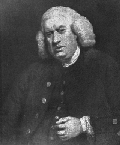Welcome to "Hypertext and Literary Learning." This site is perhaps best thought of as a "metasite": in other words, it is an exploration of and reflection on another site, "A Dictionary of Sensibility." In particular, this metasite is interested in the pedagogical possibilities and questions raised by the "Dictionary" site.
A basic familiarity with the hypertextual "Dictionary of Sensibility" (the word "dictionary" is somewhat of a misnomer in this instance) is essential to understanding the pedagogical discussions of "Hypertext and Literary Learning." If you have not visited "A Dictionary of Sensibility" you may want to spend some time there before you venture deeply into this metasite. The "Dictionary" is accessible through the launch page of this site. The launch page also includes a link to the "History of the Dictionary of Sensibility" which explains some of the important moments in the development of the "Dictionary" site. The remainder of this introduction will briefly present the specific focus of this metasite and a rationale for its structure.
Recently, there has been much helpful scholarly attention and deliberation addressing the classroom uses of the World Wide Web in this manner. This metasite will add little to these conversations. Instead, it will move in a new direction by focusing primarily on the second pedagogical use of the "Dictionary" site: its form as a model for a new sort of exhibition of knowledge in the classroom. "Hypertext and Literary Learning" seeks to understand the "Dictionary" as a pedagogical instrument like the traditional course essay or class discussion for defining, presenting, and debating knowledge in the literature, history, and cultural-studies classroom.
In thinking about the "Dictionary" in this way, the metasite hopes to accomplish two goals. The first aim is to add to the theoretical understanding of the use of hypertext as an instrument for the production of knowledge in the classroom: how does hypertext as a form affect the type and character of the knowledge it produces? The second aim is practical: the "Dictionary" site offers a relatively easy-to-employ model for such student-generated hypertextual projects.
First, the form of the "Dictionary" serves as a model that can be easily replicated in any number of subject areas: one might construct, for example, "A Dictionary of Domesticity" or "A Dictionary of Phrenology" for a course on antebellum America. One of the the authors has used the hypertext dictionary form to build "A Dictionary of Contemporary American Ethnic Literature" with a class of undergraduates. The "Dictionary" format seems especially well suited for courses and scholarly work on a historical period, a literary movement, or a cultural discourse. We employ the format here to present a pedagogical conversation which grew up around the construction of the "Dictionary" and our thinking about how its form might be used in the future. Second, we hope that by duplicating in some respects the original hypertextual form of the "Dictionary," we will provide for the metasite user an experience of the types of learning encouraged by a project of this sort.
The keyterms for "Hypertext and Literary Learning" are accessible through the launch page. Before venturing into the keyterms--the heart of this site--you might want to read the brief navigational directions linked to the launch page through the "How to Read this Article" button.
The chosen keyterms, we feel, are particularly relevant to the pedagogical goals and questions raised by the project. Many of these terms are familiar catchwords which indicate important areas of interest within traditional pedagogical discussions: for example, "collaboration," "interdisciplinary/multidisciplinary," "curriculum," and "canon." Others like "defamiliarization," "sensibility," and "exhibition/display" became significant, if idiosyncratic, concepts for us during our discussions of the pedagogical implications raised by the project. These terms are best understood through their entries. A third group of terms--"history/historicism," "cultural studies," and "ideology"--are frequent subjects of discussion in the present-day classroom which we think the "Dictionary" form is particularly adept at exploring and problematizing.
This keyword, hypertextual form is certainly not meant to be exhaustive, but rather provocative. The entries are points of discussion, a series of journal accounts on the experience of constructing a project like the "Dictionary." The design for the metasite is purposely open-ended; in fact, it emphasizes many of the qualities we wished to foreground in the original project: multivocality over a single account or conclusion; the story of a process instead of a presentation of a final result; and a sense of multiple suggestions and possibilities in contrast with attempts at authoritative claims.
We hope that this site will lead to many more "dictionaries" of all sorts
and to a better understanding of the knowledge these "dictionaries" teach.
Contributor Notes
 Back to the Launch Page
Back to the Launch Page